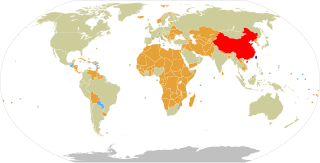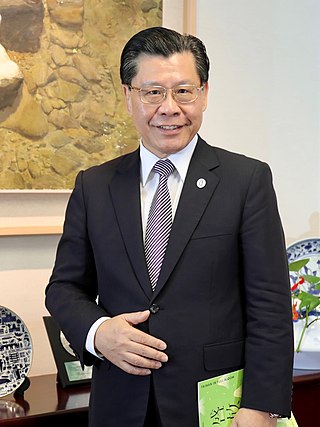Related Research Articles

Foreign relations of the Republic of China (ROC), more commonly known as Taiwan, are accomplished by efforts of the Ministry of Foreign Affairs of the Republic of China, a cabinet-level ministry of the Government of the Republic of China. As of January 2024, the ROC has formal diplomatic relations with 11 of the 193 United Nations member states and with the Holy See, which governs the Vatican City State. In addition to these relations, the ROC also maintains unofficial relations with 59 UN member states, one self-declared state (Somaliland), three territories (Guam, Hong Kong, and Macau), and the European Union via its representative offices and consulates. In 2021, the Government of the Republic of China had the 33rd largest diplomatic network in the world with 110 offices.
Academia Sinica is the national academy of the Republic of China (Taiwan). It is headquartered in Nangang, Taipei.

The Taipei Economic and Cultural Representative Office (TECRO), also known as Taipei Economic and Cultural Office (TECO), Taipei Representative Office (TRO) or Taipei Mission, is an alternative diplomatic institution serving as a de facto embassy or a consulate of the Republic of China to exercise the foreign affairs and consular services in specific countries which have established formal diplomatic relations with the People's Republic of China. The PRC denies the legitimacy of the ROC as a sovereign state and claims the ROC-controlled territories as an integral part of its territory. An exclusive mandate, namely One-China policy, requires that any country wishing to establish a diplomatic relationship with the PRC must first sever any formal relationship with the ROC. According to The Fletcher Forum of World Affairs, "non-recognition of the Taiwanese government is a prerequisite for conducting formal diplomatic relations with the PRC—in effect forcing other governments to choose between Beijing and Taipei." As a result, these countries only allow the ROC to establish representative offices instead of a fully-fledged embassy or consulate for the purpose of conducting practical bilateral relations without granting full diplomatic recognition.

National Taiwan Normal University (NTNU) is a national comprehensive university in Taipei and New Taipei City, Taiwan.
The International Chinese Language Program is an institution for intensive training in formal Mandarin, Taiwanese, Classical Chinese, and other varieties of Chinese. It is located in Gongguan, Taipei, on the main campus of National Taiwan University.

Tamkang University is a private university in Tamsui District, New Taipei City, Taiwan. It was founded in 1950 as a junior college of English. Today it is a comprehensive university with 11 colleges that serves nearly 25,000 students on four campuses.

The Ministry of Foreign Affairs is a cabinet-level ministry of Taiwan, officially the Republic of China (ROC), and is responsible for the ROC's diplomacy and foreign relations. It is headquartered in the capital Taipei. The incumbent minister is Lin Chia-lung, who took office in 2024 and is a member of the Democratic Progressive Party.

The Ministry of Education is the ministry of Taiwan responsible for incorporating educational policies and managing public schools and it oversees the educational administrative agencies of local governments.

The Taipei Economic and Cultural Office in Hong Kong (TECO) is the representative office of the Republic of China (Taiwan) in Hong Kong. Its counterpart body in Taiwan is the Hong Kong Economic, Trade and Cultural Office in Taiwan.
The MOFA Huayu Enrichment Scholarship (HES) is a competitively awarded international scholarship for studying the Mandarin language in Taiwan. The award is not limited to countries with diplomatic ties with Taiwan.

National Dong Hwa University (NDHU) is a national research university located in Hualien, Taiwan.

Francis Liang or Liang Kuo-hsin is a Taiwanese retired diplomat and former politician. Prior to this, Liang served as Vice Minister and Deputy Minister of Economic Affairs (MOEA) in 2009–2014, and chairman of the Taiwan External Trade Development Council (TAITRA) from 2014 to 2016, and the Representative of Taipei Representative Office in Singapore from 2016-2023.

The Taipei Economic and Cultural Office in Macau is the representative office of the Republic of China in Macau. Its counterpart body in Taiwan is the Macau Economic and Cultural Office in Taiwan.
Taiwan studies, or Taiwanese studies, is a multi-disciplinary academic division of area studies focused on studying Taiwan and the people on/in/of Taiwan both on its own and in comparison with other world areas. Academia Sinica, Taiwan's national level research institute, officially inaugurated its Institute of Taiwan History in 2004 following a long exploratory period beginning in 1986. Taiwan studies departments and centers have been established in numerous universities around the world and key Taiwan studies organizations have been established in North America (NATSA), Europe, and Japan. The first World Congress of Taiwan Studies (WCTS) was hosted by Taiwan's Academia Sinica on April 26–28, 2012, in Taipei, Taiwan.
Events from the year 2012 in Taiwan, Republic of China. This year is numbered Minguo 101 according to the official Republic of China calendar.

Taiwan-Bangladesh relations refer to international relations between Republic of China (Taiwan) and Bangladesh. Taiwan and Bangladesh do not have official relations.

Taiwan–United Kingdom relations refers to bilateral relations between Taiwan and the United Kingdom. Due to the One China policy, the United Kingdom does not diplomatically recognise the Government of the Republic of China and all diplomatic relations between the two countries take place on an unofficial basis. Taiwan maintains the Taipei Representative Office in the U.K. in London with a branch office in Edinburgh, while the United Kingdom maintains the British Office Taipei in Taipei.
The scholarships in Taiwan include scholarships for pursuing degrees, academic exchange, conducting research, learning Mandarin and experiencing culture in Taiwan. They are mostly funded by the Taiwanese government, universities and Academia Sinica, but also by non-profit foundations.
The Foundation for International Cooperation in Higher Education of Taiwan was established in November 2005 by the Ministry of Education (Taiwan) and over 100 universities in Taiwan, and inaugurated formally in January 2006. Currently, the Foundation has a total of 119 member universities and colleges that are also its permanent member universities.
National Dong Hwa University Chinese Language Center is one of Taiwan's most distinguished Chinese language schools for Chinese as a second language study, run by National Dong Hwa University (NDHU) in Hualien, Taiwan. In 2019, NDHU CLC's students achieved 100% pass rate in TOCFL. In 2021, NDHU CLC founded two oversea Chinese language school at universities in the United States.
References
- ↑ Study in Taiwan. "Scholarships". Archived from the original on 2 October 2014. Retrieved 20 July 2014.
- ↑ Taiwan Fellowship and Scholarship. "Scholarship for Degree" . Retrieved 20 July 2014.
- ↑ Coral Lee. "Case Study from Foreign Students Studying in Taiwan: Study in Taiwan: All the Rage!". Cultural Division of Taipei Economic & Cultural Office. Translated by Jonathan Barnard. Archived from the original on 2012-03-17. Retrieved 2012-09-19.